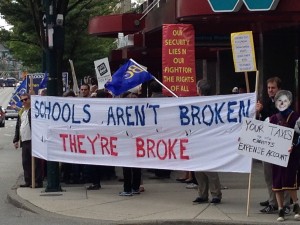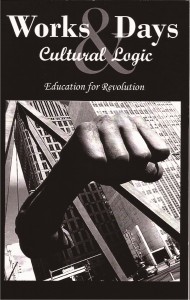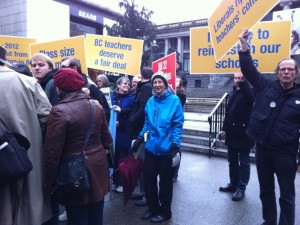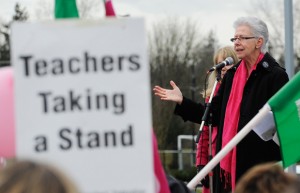Updates in brief and links
Important note:
As of Monday Sept. 10, the Chicago Teachers Union, AFT Local 1, is on strike against the Chicago Public Schools and Mayor Emanuel, who appoints the entire Board of Education. This strike is the most important fight against the corporate neoliberal attempt to privatize and destroy our public schools and, as such, deserves the support of all of us. Please go to https://afl.salsalabs.com/o/4013/c/468/p/salsa/donation/common/public/?donate_page_KEY=7204 to make a contribution to CTU’s solidarity fund and also check for local solidarity actions in your areaq. Such actions are being planned all over the nation, and even internationally. CTU is the second largest local teachers union in the US and the first, under its new leadership, to attempt to stand up to the privatizers. If they lose, all of us, even in higher ed, will see increased pressure in this direction of corporate “education reform”.
thanks for your solidarity,
Joe Berry
1. Hollywood now turning its propaganda machine on teachers and public schools
2. As Chicago teachers head toward strike, Democrats turn on their union
3. Solidarity with Chicago Teachers, from Professional Staff Congress at CUNY (see below)
THE PROFESSIONAL STAFF CONGRESS STANDS IN SUPPORT OF THE CHICAGO TEACHERS UNION
Whereas the Chicago Teachers Union (AFT Local 1, the nation’s first teachers’ union) is locked in a protracted contract battle that has important consequences for educators everywhere; and
Whereas Chicago teachers have rallied, marched, won the support of parents, and mobilized for a contract that includes fair compensation, meaningful job security for qualified teachers, smaller class sizes and a rich curriculum that includes art, music, physical education and foreign language; and
Whereas the CTU has published a report, The Schools Chicago’s Students Deserve, which eloquently argues in favor of proven reforms that would improve the education of the city’s 400,000 students, including offering pre-kindergarten for all, guaranteeing vital support services (counselors, nurses, social workers and school psychologists), having a fully-staffed library in every school, ensuring quality school facilities, ending school board practices that have increased racial segregation, and reducing class size (currently one of the highest in the state); and
Whereas 92% of the CTU membership participated in a vote to authorize a strike, and 98% of those voting voted yes; and
Whereas the CTU is opposed by an array of “reform organizations” created and financed by wealthy hedge fund managers and businessmen, in alliance with Mayor Rahm Emanuel, who together are trying to impose a regimen of evaluating teachers based on students’ standardized test scores, imposing a “merit” pay scheme for teachers while eliminating traditional salary increases for seniority and additional education, and mandating a longer school year and school day without a proportional increase in salary; and
Whereas the opponents of the CTU have used the deep pockets of wealthy supporters to launch a torrent of ads attempting to discredit the union and promote charter schools; and
Whereas the CTU has established a “CTU Solidarity Fund” to raise money to respond to the negative ads of their opponents and circulate its own report, The Schools Chicago’s Students Deserve; and
Whereas a victory for Chicago teachers would greatly encourage teachers everywhere who are resisting attempts to blame educators for low student achievement rather than point the finger at inadequate school funding and widespread poverty, and standing up to forces who would eviscerate hard-won tenure and seniority protections and salary levels, as well as weaken teacher unions; and
Whereas a victory for the Chicago Teachers Union would be a victory for public-sector employees nationally as we struggle to resist the imposition of austerity conditions; a victory for CUNY faculty and staff, as we face a regime of testing and standardization; and a victory for all who oppose the privatization of public resources and the plundering of public assets; therefore be it
Resolved that the Professional Staff Congress/CUNY (Local 2334, AFT) support the Chicago Teachers Union in its fight to negotiate a contract that meets the needs of its members and their students; and be it further
Resolved that the Professional Staff Congress contribute a sum of $3,500 to the CTU Solidarity Fund; and be it further
Resolved that the Professional Staff Congress urge the NYC Central Labor Council to adopt a similar resolution; and be it further
Resolved that the Professional Staff Congress encourage its members to show support in any or all of the following ways: signing petitions in support of the CTU struggle, making individual donations to the CTU Solidarity Fund, writing letters of support, becoming Associate Members of CTU, and attending local solidarity events.

 Follow
Follow


